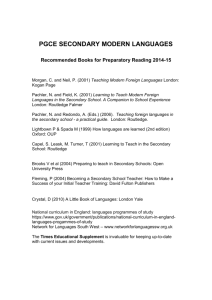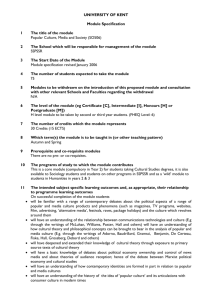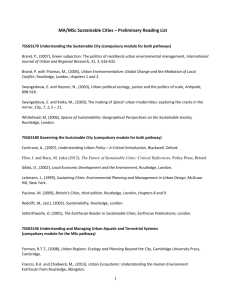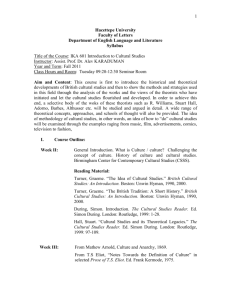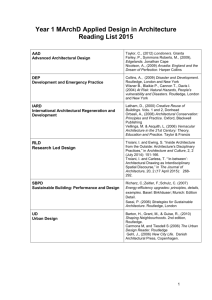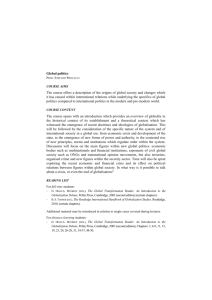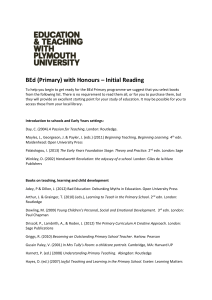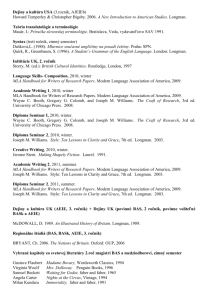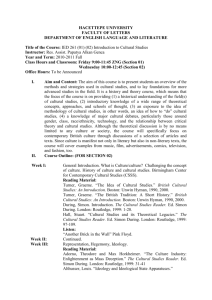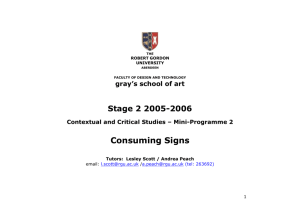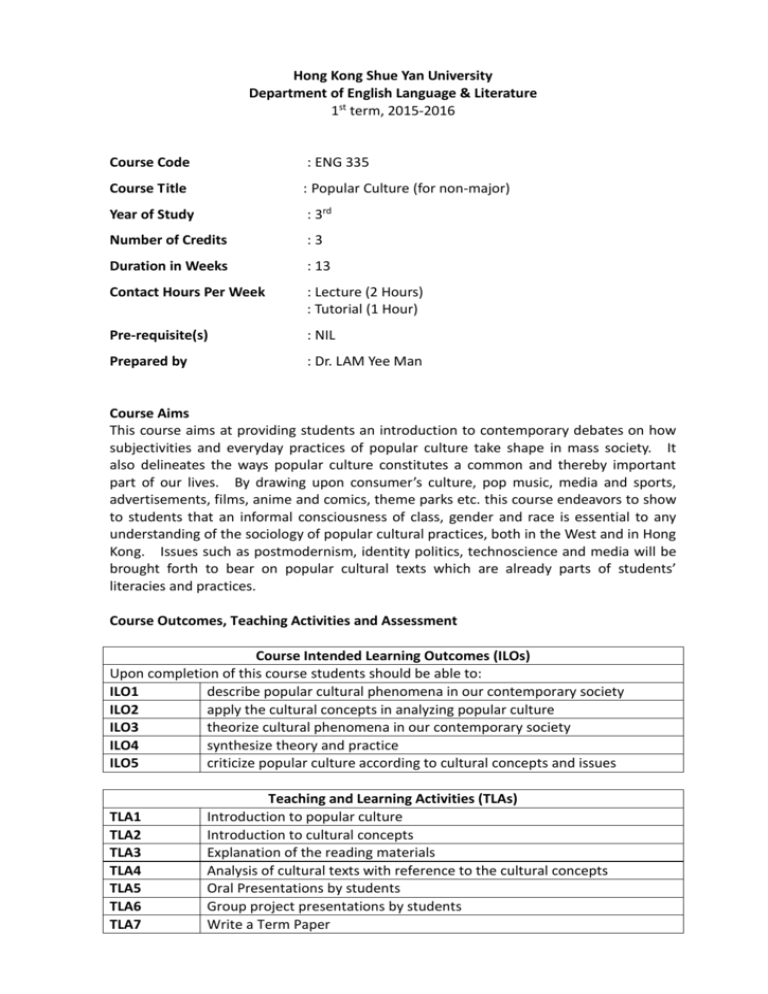
Hong Kong Shue Yan University
Department of English Language & Literature
1st term, 2015-2016
Course Code
: ENG 335
Course Title
: Popular Culture (for non-major)
Year of Study
: 3rd
Number of Credits
:3
Duration in Weeks
: 13
Contact Hours Per Week
: Lecture (2 Hours)
: Tutorial (1 Hour)
Pre-requisite(s)
: NIL
Prepared by
: Dr. LAM Yee Man
Course Aims
This course aims at providing students an introduction to contemporary debates on how
subjectivities and everyday practices of popular culture take shape in mass society. It
also delineates the ways popular culture constitutes a common and thereby important
part of our lives. By drawing upon consumer’s culture, pop music, media and sports,
advertisements, films, anime and comics, theme parks etc. this course endeavors to show
to students that an informal consciousness of class, gender and race is essential to any
understanding of the sociology of popular cultural practices, both in the West and in Hong
Kong. Issues such as postmodernism, identity politics, technoscience and media will be
brought forth to bear on popular cultural texts which are already parts of students’
literacies and practices.
Course Outcomes, Teaching Activities and Assessment
Course Intended Learning Outcomes (ILOs)
Upon completion of this course students should be able to:
ILO1
describe popular cultural phenomena in our contemporary society
ILO2
apply the cultural concepts in analyzing popular culture
ILO3
theorize cultural phenomena in our contemporary society
ILO4
synthesize theory and practice
ILO5
criticize popular culture according to cultural concepts and issues
TLA1
TLA2
TLA3
TLA4
TLA5
TLA6
TLA7
Teaching and Learning Activities (TLAs)
Introduction to popular culture
Introduction to cultural concepts
Explanation of the reading materials
Analysis of cultural texts with reference to the cultural concepts
Oral Presentations by students
Group project presentations by students
Write a Term Paper
2
Assessment Tasks (ATs)
AT1
AT2
AT3
AT4
AT5
Blog Post
Tutorial Participation
Tutorial Presentation (group)
Individual Term Paper / Creative Project
Final Examination
5%
10%
20%
25%
40%
TOTAL 100%
Alignment of Course Intended Learning Outcomes, Teaching and Learning Activities and
Assessment Tasks
Course Intended Learning
Teaching and Learning
Assessment Tasks
Outcomes
Activities
ILO1
TLA1,5,6,7
AT1,2,3,4
ILO2
TLA1,2,4,5,6,7
AT1,3,4,5
ILO3
TLA2,3,5,7
AT1,3,4,5
ILO4
TLA4,6,7
AT1,3,4,5
ILO5
TLA3,4,5,6,7
AT1,2,3,4,5
Course Outline (Tentative)
Week 1 Introduction
Douglas Kellner, “Cultural Studies, Multiculturalism, and Media Culture”, in Gender, Race,
and Class in Media: A Critical Reader, ed. Gail Dines and Jean M. Humez (Thousand Oaks,
Calif.: SAGE Publications, 2011).
Week 2 Distinctions
Herbert Gans, Popular Culture and High Culture: An Analysis and Evaluation of Taste (New
York: Basic Books, 1999), pp. 27-88.
Pierre Bourdieu, “Introduction”, Distinction: A Social Critique of the Judgment of Taste
(Routledge and K. Paul: London, 1984), pp. 1-7.
Week 3 Culture Industry
Theodor Adorno, “Culture Industry Reconsidered”, in The Adorno Reader, ed. Brian
O’Connor (Oxford, UK; Malden, Mass: Blackwell, 2000).
Week 4 Popular Music
Michael Ryan, “Music”, in Cultural Studies: A Practical Introduction (Chichester; West
Suxxes, U.K.; Malden, MA: Wiley-Blackwell, 2010).
Case Study: MJ
Week 5 Hero Myth
Maria Nikolajeva, “Harry Potter - A Return to the Romantic Hero”, in Harry Potter's World:
Multidisciplinary Critical Perspectives, ed. Elizabeth E. Heilman (New York: Routledge
Falmer, 2003).
3
Week 6 Fairy Tales
Karen Rowe, ‘“Feminism and Fairy Tales” in Don’t Bet on the Prince: Contemporary
Feminist Fairy Tales in Northern and England, ed. Jack Zipes (Aldershot, Hants: Gower,
1986), pp. 209-226.
Week 7 Soap Opera
John Fiske, “Gendered Television: Femininity” in Television Culture (London; New York:
Routledge, 2011).
Week 8 TV and Masculinity
John Fiske, “Gendered Television: Masculinity” in Television Culture (London; New York:
Routledge, 2011).
Week 9 Postmodernism, and Popular Culture
John Storey, Cultural Theory and Popular Culture (Harlow, England; New York: Pearson
Longman, 2012), pp. 146-170
Week 10 Ideology -- Case Study
John Storey. (2009) Cultural Theory and Popular Culture. Longman. pp. 70-81.
Week 11 Stardom
Richard Dyer, “Stars” in Stardom and Celebrity: A Reader, ed. Sean Redmond, Su Holmes
(Los Angeles, Calif.; London: SAGE Publications, 2007).
Week 12 Fans and Subculture
Henry Jenkins, Textual Poachers: Television Fans and Participatory Culture (New York:
Routledge, 1992), pp. 9-44.
Week 13 Cyberculture
Bell, David et al. (2004) Cyberculture: The Key Concepts. London: Routledge. pp. 39-57.
Academic Honesty
You are expected to do your own work. Dishonesty in fulfilling any assignment undermines the
learning process and the integrity of your college degree. Engaging in dishonest or unethical
behavior is forbidden and will result in disciplinary action, specifically a failing grade on the
assignment with no opportunity for resubmission. A second infraction will result in an F for the
course and a report to College officials. Examples of prohibited behavior are:
Cheating – an act of deception by which a student misleadingly demonstrates that s/he has
mastered information on an academic exercise. Examples include:
Copying or allowing another to copy a test, quiz, paper, or project
Submitting a paper or major portions of a paper that has been previously submitted for
another class without permission of the current instructor
Turning in written assignments that are not your own work (including homework)
Plagiarism – the act of representing the work of another as one’s own without giving credit.
Failing to give credit for ideas and material taken from others
Representing another’s artistic or scholarly work as one’s own
Fabrication – the intentional use of invented information or the falsification of research or
other findings with the intent to deceive
To comply with the University’s policy, the term paper has to be submitted to VeriGuide.
4
Teaching Approach
This is a 2-hour lecture and 1-hour tutorial course. Lectures will focus on specific topics
according to the syllabus, emphasizing discussion at the same time. Tutorials will be
devoted to group discussion, team presentations. Presentations could be topic based or
on larger projects of empirical research. Final paper will be due towards the end of the
semester.
Resources:
Principal Texts
Angela McRobbie, In the Culture Society: Art, Fashion and Popular Music. London:
Routledge, 1999).
John Storey, “What is Popular Culture?”. Cultural Theory and Popular Culture: A Reader.
(Harlow: Pearson Longman, 2009).
John Storey, Cultural Theory and Popular Culture: An Introduction. Harlow: Pearson
Longman, 2009).
Ray Browne, Profiles of Popular Culture: A Reader (London: The University of Wisconsin
Press, 2005).
Supplementary Texts
Dick Hebdige, Subculture: The Meaning of Style (London: Routledge, 1979).
Herbert Gans, Popular Culture And High Culture: An Analysis And Evaluation Of Taste (New
York: Basic Books, 1999).
Michael Pickering, Research Methods for Cultural Studies (Edinburg: Edinburg University
Press, 2008).
Raiford Guins & Omayra Zaragoza Cruz, Popular Culture: A Reader (London: Sage, 2005).
Stuart Sim. The Routledge Companion to Postmodernim. London: Routledge, 2005).
Toby Miller & Alec McHoul, Popular Culture and Everyday Life. (London: Sage, 1998).

